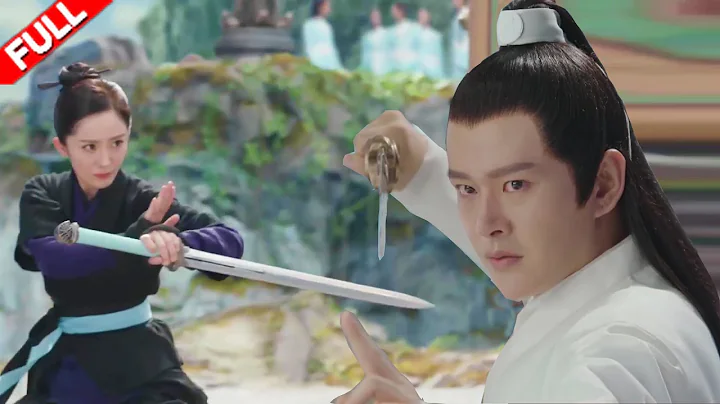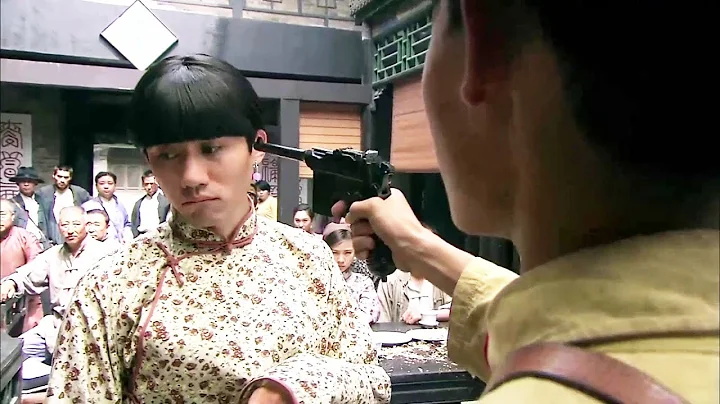"Shi Nodou·The Fierce Women of Houguan County Annihilate their Enemies" says, "Mrs. Shentu is already pregnant with Liujia, and she will be satisfied in ten months...give birth to a son, and love is like a treasure."
In the Southern Song Dynasty , there was a woman named Shentu Xiguang in Changle County, Fujian. Her family made a living from fishing. Although she was not rich, the family atmosphere was harmonious, with a loving father and a filial son.
Shentu Xiguang also had both talent and character. She was a lady of the world. There were many people from near and far who wanted to marry her, but she didn't agree to any of them.

Until an accidental opportunity, Dong Chang, a poor scholar, traveled to learn Changle County . Shentu Xiguang saw his talent and inquired about his reputation, and couldn't help but fall in love with him at first sight.
Dong Chang naturally has a good impression of Shentu Xiguang.
The man is affectionate and the concubine is interested. With the help of their parents, the two are very loving. Lady Shentu even gave birth to a son.
Unexpectedly, this kind of life of raising eyebrows aroused the jealousy of many local people, who all coveted the beauty of Lady Shentu.
Fang Liuyi, a dandy, was one of them. He was furious when he saw that Dong Chang, who came from a poor family, had such a lovely wife, so he found Yao Erma, a local talkative woman, and planned to send Dong Chang to prison and then brutally killed him.
After Mrs. Shentu found out the truth, she was determined to avenge her husband. On the day she got married to Fang Liuyi, she stabbed him in the heart with a knife, stabbed Yao Erma who was responsible for the instigation to death, and then committed suicide.

In ancient times when the three obediences and four virtues were highly respected, Lady Shentu's spirit of bravely fighting against power infected everyone, and they buried her with Dong Chang.
The beginning of the story is so happy and satisfying, but the ending is so sad.
Going back to the beginning of the chapter when the two of them were harmonious and beautiful, Lady Shentu was very happy to have a son. However, after reading it carefully, many people may have a question: why did the ancients call a woman's pregnancy "pregnant with Liujia"?
The connotation of "Liujia"
In order to understand the meaning of "Liujia", we must first clarify the connotation of "Liujia".
The term "Liujia" originated from the "Stem and Branch Era Method". It was developed during the Yin and Shang Dynasties. has a certain status in the world and demonstrates the wisdom of ancient Chinese people.

"Stems" refers to the heavenly stems and earthly branches. The heavenly stems are divided into ten symbols: "A, B, B, Ding, Wu, Ji, Geng, Xin, Ren, and Gui". The earthly branches include "Zi, Chou, Yin, and Mao". ", Chen, Si, Wu, Wei, Shen, You, Xu, Hai" twelve symbols.
They match in order and form sixty groups together to represent the year, month and day, which is convenient for calculating time.
For example, the Heavenly Stems and Earthly Branches can be combined freely. Starting from "Jiuzi", the reincarnation is sixty years, and this is the year; if the month is recorded, the Earthly Branches of exactly twelve months will be used; Heavenly Stems and Earthly Branches can also be combined to record The day is the same as the year; the hour and the month are the same, and the same method is used.
are arranged and combined according to the heavenly stems and earthly branches, and combined with the fixed order of " stems and branches chronology ", they will be divided into 60 groups, forming Jiazi, Yichou, Bingyin... This is a cycle.
A heavenly stem will appear six times in each reincarnation. Taking "Jia" as an example, there will be Jiazi, Jiayin, Jiachen, Jiawu, Jiashen, and Jiaxu, which are called "Liujia."
This is This is the origin of what we call "Liujia".

To this day, we still use this method of counting. For example, this year is 2022, and we can also call it Renyin . But in fact this is the year. The method of counting dates is quite difficult. In order to pass on this traditional culture, the ancients required people to learn it from an early age. It is recorded in the book that "when you enter elementary school at the age of eight, you will learn the affairs of Liujia, Wufang and Secretary before you know the office." "Parents and Children's Day".
From the day they entered elementary school, children in ancient times had to know the chronology of the zodiac and branches by heart, and the pressure was not small.
With the advancement of modern science and technology, we can know what day it is by turning on our mobile phones. , and no special memory is required.

After understanding the origin and origin of "Liujia", we can't help but wonder how the "Liujia" used as a chronology is connected with a woman's pregnancy?
Why does "Liujia" represent the fetus? What's the story?
A few words about "being pregnant with Liujia"
Speaking of "being pregnant with Liujia", we have to start with the " Yin and Yang Five Elements Theory" and the prevalence of Taoism in the pre-Qin period.
Unlike modern people, ancient people had an innate respect for nature. They believe that all things have spirituality, and they are also very popular in worshiping heaven and earth. Over time, the "Six Ding Liujia God" was derived.
Liuding Liujia God is a famous figure in Chinese mythology and legend, and is also the origin of the birth of all things.
"六丁" means the Yin God, and "Liujia" means the Yang God, which happens to be a mixture of Yin and Yang. They are servants of heaven and earth and common guardian gods.

developed into Han Dynasty , which highly respected Taoism. At the same time, under the dominance of the idea of the unity of nature and man, the ancients integrated this idea into traditional Chinese medicine, and the "Yin Yang and Five Elements Theory" appeared.
For example, in the "Huangdi Neijing ", for the first time, each part of the human body is linked to the chronology of the stems and branches. The book corresponds to the human eyes and the sun and the moon, and the distribution of the earth to the human nine. The orifice corresponds to the orifice, and the human voice corresponds to thunder and lightning...
During the Three Kingdoms and Jin Dynasties and the Sui and Tang Dynasties, Taoism further developed, and "Liujia" was given the meaning of a fetus, absorbing the essence of heaven and earth.
It is recorded in "Sui Shu·Jing Ji Zhi San" that the six Jiazi, Jiayin, Jiachen, Jiawu, Jiashen and Jiaxu are considered to be the time when heaven and earth created all things, and women are more likely to get pregnant.
Of course, there is still a certain rationality in Taoist medical skills.
There is a book in the Tang Dynasty that records, "Liujia, one Jiayin wood, governs the bones; two Jiachen wind, governs the breath..."

It is not difficult to see that each stage such as Jiazi represents the process of fetal development. , For example, breath is produced during the Jiachen period, and teeth grow during the Jiashen period...
According to this theory, the fetal formation time is 60 days in total. Coincidentally, modern scientific methods also estimate that the fetus can take shape at 12 weeks.
It can be said that the ancient people were very wise and could calculate the formation time of the fetus just by relying on simple medical methods.
The Song Dynasty and Ming Dynasty can be said to have pushed this theory to a more concrete and popular stage.
They began to use "Liujia" to refer to the fetus. For example, Ling Shuchu in the late Ming Dynasty wrote in "The Surprise at the First Moment of Shooting the Case", "Not long after the marriage, I was pregnant with Liujia, and on the anniversary, I gave birth to a son."
Obviously, the "Liujia" here is no different from a fetus.

Regarding "pregnant with Liujia", there are some other versions of the explanation, which express the ancient people's good wishes for the children in women's bellies.
In the eyes of some people, "Liujia" refers to six divine soldiers and generals, and "pregnant with Liujia" means having six immortals. Although there is no scientific basis for this, in the ancient times, heirs were the most important thing. A beautiful hope.
In the chronology of the stems and branches, "Liujia" is a reincarnation, which also means sixty years, so there are also legends among the people. "Liujia" generally refers to old men and old ladies. Because of their age, their faces are covered with wrinkles, which is different from children. There isn't much difference in appearance at birth. "Being pregnant with Liujia" naturally represents the birth of new life.
In addition, there is a relatively unreliable saying. The ancients often said "Hide five but not hide six." That is to say, a woman cannot tell when she is five months pregnant, but she will be pregnant at six months. It can be seen quite clearly that "Liujia" is called for women who are more than six months pregnant.
But in fact, this is a bit nonsense. In ancient times, women's clothes were mostly skirts and tops, so it was relatively easy to hide their pregnancy.

For example, in "The Legend of Zhen Huan", Zhen Huan returned to the palace for her father, but had no choice but to contact the emperor. In order to avoid being seen to be pregnant, she tied her waist and did not arouse anyone's suspicion.
Some people even think that pregnant people are more burdensome than other people, like wearing six pieces of armor, which is why there is a saying of "being pregnant with six armors".
These statements are based on the state of pregnant women to interpret "Liujia", but some people understand "pregnant with Liujia" from actual life situations.
Due to the lack of advanced equipment, farming in ancient times was particularly complicated and productivity was relatively low. There was also the idea of "men farmed and women weaved". In this situation, it is easy for people to develop the idea of preferring sons over daughters. Most people hope that they can have a son to carry on the family line and continue the incense.
As mentioned earlier, "Jia" belongs to wood and Yang, and "Liujia" means Yang in the heavenly stems.

In ancient worship, females were first respected and yin was respected. Common legends include the legend of Xuanniaothe birth of Shang "who knows his mother but not his father", and a series of myths and legends such as Nuwa's creation of human beings, which fully reflect the formation of a matriarchal society.
It was not until later that my country's native religion, Taoism, reaffirmed the respect for the male, the masculine, and formed a complete set of theories that "patriarchal society" gained a firm foothold in ancient times.
The idea of "men are superior to women" has also taken root in people's minds. Men have a high status, so people are naturally willing to call pregnancy "pregnant."
As word of mouth spreads from person to person, "pregnant with Liujia" has become a popular blessing and auspicious saying, which has the same meaning as what we often say in modern times: "a happy marriage for a hundred years" and "a precious child early".
In addition, the medical level and other conditions in ancient times were not good, and people's life span was not long, so some people called a person's life Jiazi. "Being pregnant with Liujia" is also a wish for the child, hoping that he will be born and grow up healthily, and that he will have the opportunity to stand out when he grows up.

No matter which way you say it, it represents the ancient people's ardent expectations for their unborn children, and conveys to us the rich traditional Chinese culture .
Since "pregnant with Liujia" is endowed with many beautiful meanings, why do modern people rarely say "pregnant with Liujia" to pregnant women?
Is there any profound reason behind this?
The subversion of the status of modern women
Friends who have watched " Ruyi's Royal Love in the Palace " will have an impression of the competition between concubines. The medical skills in ancient times were not developed, and it was not possible to conclude through B ultrasound and other means like modern times. Whether the baby was a boy or a girl, people had to rely on folklore.
The most well-known saying is "sour son and spicy girl". At that time, in order to hide her preference for eating sour food, Ruyi deliberately ate spicy food in front of other people so that others would think she was pregnant with a girl.

The reason is that people in ancient times generally believed that boys can inherit the throne, while girls are of no use. When they grow up, they have to marry, and even have to bear the husband's family name. They must follow the three cardinal principles, five constant principles, three obedience and four virtues, and they cannot live at all. From me.
If the royal family gives birth to a daughter, even though she can be as knowledgeable and courteous as a boy and has a rich reserve of knowledge, she will probably have to take on the responsibility of getting married in the future. There is no other choice at all. This is beneficial to the country, but not to her mother. There is almost no benefit.
Therefore, concubines in ancient times had to fight hard to be favored, hoping that one day they would be blessed by the emperor and give birth to a prince, who would be successful in the future, and she would be regarded as more valuable than her son, and would sit firmly on the throne of the empress dowager.
This can also fully explain that in "The Legend of Zhen Huan", the queen tried her best to get rid of the children of other concubines. Later, in order to compete with Zhen Huan, she adopted the third elder brother after the death of Qi Concubine , just for her own future. Can have endless power and status.
It can be seen that the ancient people's "pregnant Liujia" originally meant that a woman had a boy, not a girl.

Later, with the changes in modern people's thinking, the status of men and women was relatively equal, and there was no longer any notion that men were superior to women.
"Pregnant with Liujia" no longer specifically refers to a boy in the belly, but has become a general term for women's pregnancy.
In the eyes of modern people, whether it is a boy or a girl, it is the apple of the family's eye. Except for some rural areas that still maintain a certain prejudice against this, modern people actually don't care that much about the gender of the child in their belly.
This actually reflects the improvement of the status of women in society.
First, after the reform and opening up, the Constitution and other laws further stipulated the status that women should enjoy, and effectively protected women's political rights in the form of articles. Women began to have a place in the political arena and were no longer just accessories to men.
Secondly, after the founding of the People's Republic of China, the country introduced a series of policies to ensure the employment of women. They are no longer just primary school teachers, childcare workers, medical workers, etc., but have made more progress in their careers. Women's economic status Also improved.
Third, in terms of educational status, women’s educational opportunities have improved significantly since the 1960s. Women are generally recognized by society, completely breaking the rumor that “women are inferior to men”.
Finally, and more importantly, with the changes of the times, women no longer just pay blindly in marriage and family. In modern times, the saying "men are the masters of domestic affairs and women are the masters of foreign affairs" has emerged. The reversal of male and female roles fully reflects Yes, the status of women has improved.

To sum up, from the perspective of politics, economy, education, marriage and other aspects, the status of women has improved. Feminism is no longer just an empty slogan, but a clear case of real action.
Modern women are beginning to wake up. They are gradually leaving the family, getting rid of the job of only doing laundry, cooking and taking care of children, and truly going into society and facing the whole world.
From this point of view, in this multicultural modern world, gender equality and female independence have long been deeply rooted in the hearts of the people. "Being pregnant" seems not so applicable, but we also have to admit that as a part of traditional culture , it still expresses people’s expectations for newborn babies.
Even if the history goes thousands of years ago, it is still a shining star in the night sky and the crystallization of the wisdom of the ancients.

















